Ь§
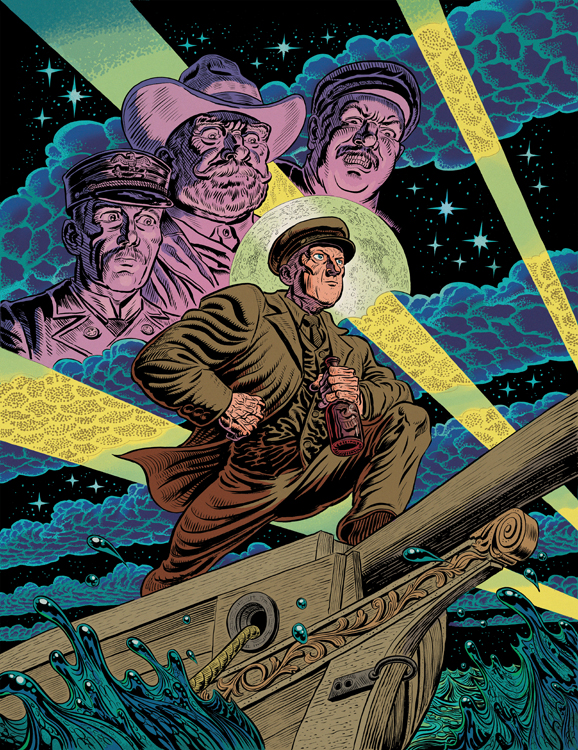
Grand Haven, 1908.
Subtract a little more than 100 years from the present, along with the boutiques and ice cream parlors, from this city nestled along the eastern shore of Lake Michigan. On the great map of Michigan т your right hand, turned toward you т itтs about where the largest crease of your hand runs off the edge. Whittle the places you can now stop for a drink down to a dozen saloons, some with names like The Bank and The Health Office, technically making honest men of late-returning husbands, explaining where theyтve been. Now look to the wide channel and the open lake and subtract the tanning teens and retirees and replace their boardwalks with bare, sandy dunes. Mute the obnoxious noise of the wave runner, and listen to the words of one old-timer recalling when he enjoyed sitting at the end of the pier to watch the busy harbor traffic of schooners arriving or departing on the horizon.
It is June 11, 1908, and youтre in one of those saloons. By now you will have noticed Dan Seavey. Heтs a man you notice, whether he wants you to or not. Chances are he does. He is a large man, taller than 6 feet and approaching 250 pounds, and is called тRoaring Danт for a reason.
According to Seavey historian Richard J. Boyd, he had a ruddy, freckled complexion, and a raspy voice with a New England twang. тHis muscular upper torso, bedecked with very long arms and huge hands, tapered into a trim lower body, creating an extremely imposing physique. тІ Seavey was occasionally described by women as the тmost handsome man in town.тт
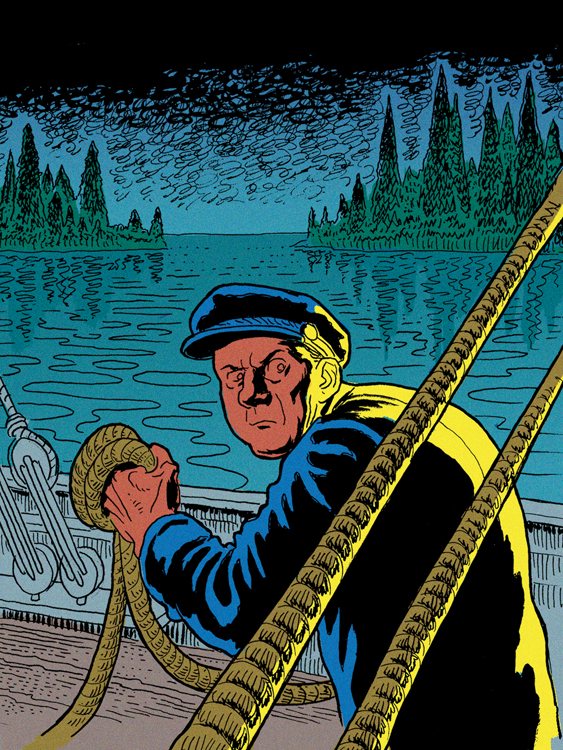
He was never in town long, and would not be long in Grand Haven. Heтs with Robert McCormick, captain of the Nellie Johnson. We are no longer sure why. According to some reports, there may have been an old score to settle. According to others т and Seavey himself, speaking with authorities some weeks later т he was a mere sailor on McCormickтs ship. Seavey, born in Bethel, Maine, in 1865 т a runaway who at 13 had already been aboard several schooners and by 18 was in the Navy т is now 43 years old. Heтs a savvy тІ letтs for the moment, say тbusinessman.т His legacy will include an offshore casino and brothel, a legitimate shipping business (never mind the prostitutes occasionally along for the ride), polygamy, archaeology (and perhaps grave-robbing), and what might be his most famous venture: luring ships to rocks with false lights, where he would find them wrecked and make off with their cargo.
And fighting. Oh yes, Seavey could fight т would travel to another city just to accept a challenge, as he once did in Manistee, destroying an entire bar as well as, finally, the man who crossed him.
Call him what you will. Pirate might suffice, but it is not a word, as of this night in 1908, that has been uttered widely, if at all, to refer to Seavey just yet.
If he is indeed a mere sailor on the Nellie Johnson, it is for only one reason, and that is for the booty weighing her down in the nearby harbor.
He needs only to overtake captain and crew. He is a fierce fighter, but he has a fiercer weapon: drinking. He was known to buy a round for the house when he could, and perhaps he did that night, over and over until he was the only one who could stand, let alone sail. With two other sailors under his command, they boarded the Nellie Johnson, still loaded with precious Great Lakes cargo т not gold or silver, but a bellyful of cedar posts, once tall trees along the cold waters of Lake Superior т and filled its sails with wind, headed south for Chicago.
Piracy is a term with loose definitions. We now associate it with movies, a Disney ride, the open ocean, and freedom. What sets piracy apart from other criminal acts, however, is really only water. Robbery on the water. Seavey was far from the only man on the Great Lakes who decided the law ended with the shore, but until that moment, when McCormick would wake to find his boat gone, no warrant had ever been issued for piracy before.
According to the newspaper of the time, it was a crime punishable by death.
тFor in their interflowing aggregate, those grand freshwater seas of ours т Erie, and Ontario, and Huron, and Superior, and Michigan т possess an ocean-like expansiveness, with many of the oceanтs noblest traits.тЬ§т Herman Melville, Moby Dick
Captain Preston H. Uberroth was a man dedicated to saving lives on the sea т and lakes. He had a long career with the Revenue Cutter Service (which in 1915 would combine with Life Saving Service to become the U.S. Coast Guard) peppered with newspaper articles praising him for saving people т from forest fires near Chicago, where he made his crew fight flames while splitting their limited rations with hungry civilians and from a wrecked British ship off the coast of Canada. He knows determination and hardship. In 1901, as a lieutenant, he was in the Atlantic off the coast of Sandy Hook when the Astral, a ship of the Standard Oil Company, was in distress т three men were attempting a mutiny. Uberroth was part of an armed team sent to arrest the mutineers in wind so strong and cold that the men were тdrenched with flying spray that froze as it fell.т
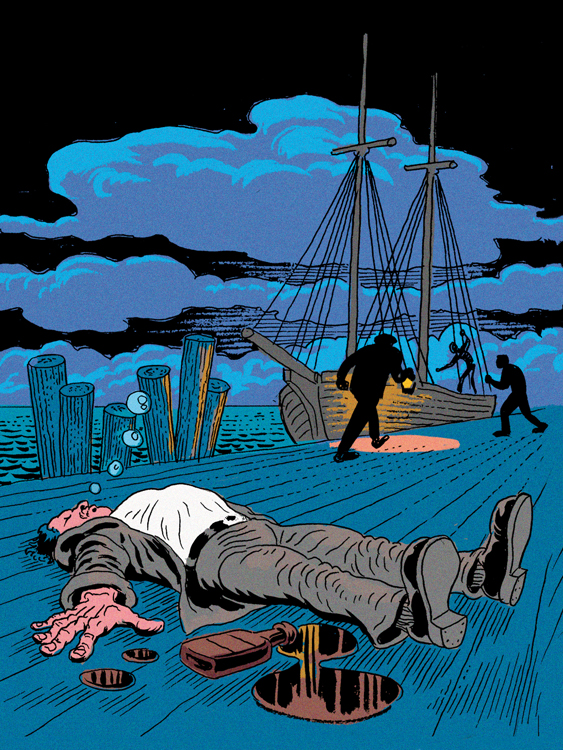
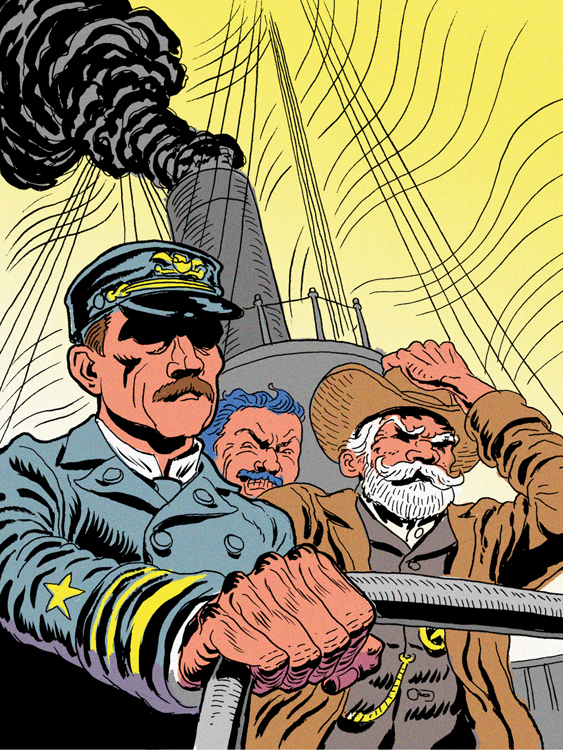
In December of 1907, he took command of the Great Lakes cutter Tuscarora. Six months later, he had an assignment. It was, it seemed, a mutiny. But a strange one. Someone had stolen a boat, leaving behind a very hungover captain.
It took a while to get the call. Captain McCormick was тso stupefied,т according to Boyd, тthat he couldnтt convince anyone in Grand Haven that his vessel was really missing.т
Deputy Marshall Thomas Currier was assigned to the case. A heavy man with white hair and a full matching mustache, he boarded the Tuscarora with Uberroth. McCormick, hell-bent on recovering his ship, joined them. Uberroth was the best captain they could hope for. Currier was an experienced man-hunter, and McCormick was driven by desperation т a captain without a boat.
But Seavey already had a head start. And they had no idea where he was.
тSeaward ho! Hang the treasure! Itтs the glory of the sea that has turned my head.тЬ§т Robert Louis Stevenson, Treasure Island
Reaching Chicago, Seavey ran into trouble т he couldnтt sell the timber. He was now at the far end of Lake Michigan, with a boat that wasnтt his, full of a cargo he couldnтt sell.
The coastal shores of Michigan are now coveted, each square foot of frontage accounted for and valued down to the dollar. In 1908, Michigan was a different state. Far inland, in Flint, a man named Billy Durant was starting a company called General Motors. Entire forests had been shorn as lumber gave way to industry, but much of the stateтs two peninsulas were still a vast тhowling wildernessт with ports dotting the shore. And Seavey was a man of the lakes. He began his way north, to his own boat, the Wanderer, stopping and hiding out along the way in the coves and rivers he knew so well. He was smart enough to know that by now, someone would be on his tail. His engine, and his expertise, was the wind, but he would have certainly known also that even the strongest breeze was no match for the black smoke that might appear on the horizon at any moment.
Uberroth, meanwhile, started looking, port by port. The search began in Michigan City, Ind., then Benton Harbor and тevery port on the Michigan shore,т Currier said. At every Life Saving station Uberroth would check in with the commanding officer, briefing him on the Seavey case and asking for help. For days, it did not go well.
They had the advantage of technology, but Seavey had the advantages of a lakeman. While the Tuscarora made its methodical checking of ports, Seavey needed only to continue slipping ahead, one of any number of schooners coming in and out of ports or sailing along the coast. Every moment Uberrothтs steamer sat docked waiting for news was another gust in Seaveyтs sails, taking him farther north, possibly to Canada or hiding among any of the islands of the northern Great Lakes. Seavey knew how to survive, and Summer Island and St. Martin Island, where Seavey had shacks from which heтd conduct his illegal venison poaching business, were just over 60 miles away.
They were far beyond Grand Haven before they found any sign of him, in Ludington, where Uberroth began phoning up the coast. Then, there was hope. Life Savers located Seavey in Frankfort, a little over 60 miles up the coast.
Uberroth didnтt rush. He may have been thinking tactically т waiting for the right moment, after night fell, for the element of surprise. While fueling in Manistee, a man fell overboard from a nearby ferry, and Uberroth had his men conduct a fruitless search т first for the man, then the body, until the late afternoon.
McCormick, it seemed, could not wait. He took a train to Frankfort to confront Seavey face-to-face. Uberroth, meanwhile, stayed on the Tuscarora, waiting, waiting, until 10 p.m. and the sun had dipped into Lake Michigan and he could steam ahead under cover of darkness.
It was June 26, more than two weeks since Seavey had first taken the Nellie Johnson.
The next day they pulled into Frankfort. тAnd there we found the Nellie Johnson,т Currier told a reporter. тShe had six feet of water in her hold but all of her cargo. Out at sea from Frankfort we sighted the Wanderer.т
тThe modern steamship advances upon a still and overshadowed sea with a pulsating tremor of her frame, an occasional clang in her depths, as if she had an iron heart in her iron bodyтІbut in a gale, the silent machinery of a sailing-ship would catch not only the power, but the wild and exulting voice of the worldтs soul.т
т Joseph Conrad, Mirror of the Sea
According to one report, Seavey looked behind him and saw, far on the horizon, that black smoke signaling that Uberroth was not on his tail and shouted to his crew, тMove, you son of a sea cook, you waterlogged landlubber. Get hold of that topgallant sheet and pull in those peak halyards.т
Perhaps he said it, or perhaps it is the point in the tale when the papers could no longer help themselves, and the myth of Roaring Dan Seavey began to grow.

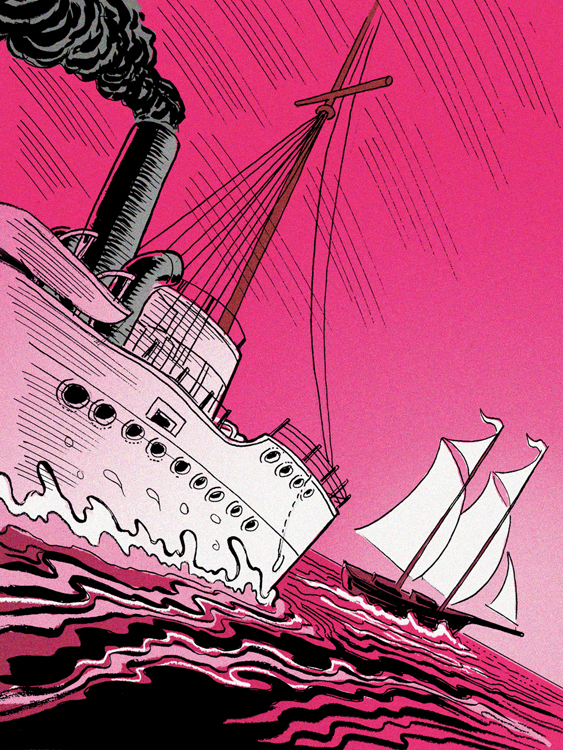
There was a stiff breeze that day and Seavey was grabbing every bit of it he could with the Wandererтs two sails. With the Wanderer now in sight, it might have now been no contest, but Uberroth wasnтt taking any chances. The Tuscaroraтs boilers were so hot the paint burned off the smokestack. The final chase lasted an hour, ending, according to some reports (which many now doubt true), with a cannon shot from the Tuscarora over the bow of the Wanderer, finally bringing Seavey to a halt.
If reporters made up the cannon shot, they werenтt the only ones caught up in the action. Currier was quoted as saying, тI have chased criminals all my life, but this was the most thrilling experience of many years. I never before chased a pirate with a steamship, and probably never will again, but of all the jolly pirates Seavey is the jolliest.т
Whatever happened, Uberroth sent an armed crew aboard, placed Seavey in irons, and brought him to the Tuscarora, which then made for Chicago.
тSeavey was surprised, to say the least,т according to Currier. тHe said that we would never have caught him had he had another half-hourтs start.т
тWhere there is a sea, there are pirates.тЬ§т Greek proverb
In Chicago, Seavey was not officially charged with piracy. Rather, he was charged with mutiny and revolt. It could have carried a penalty of thousands of dollars and hard labor, but a grand jury failed to convict him, and he walked, and later sailed free. It is unclear how or why, but he was reported to be back in Frankfort just a few days later, тwearing a broad smile and a brand new suit of clothes.т
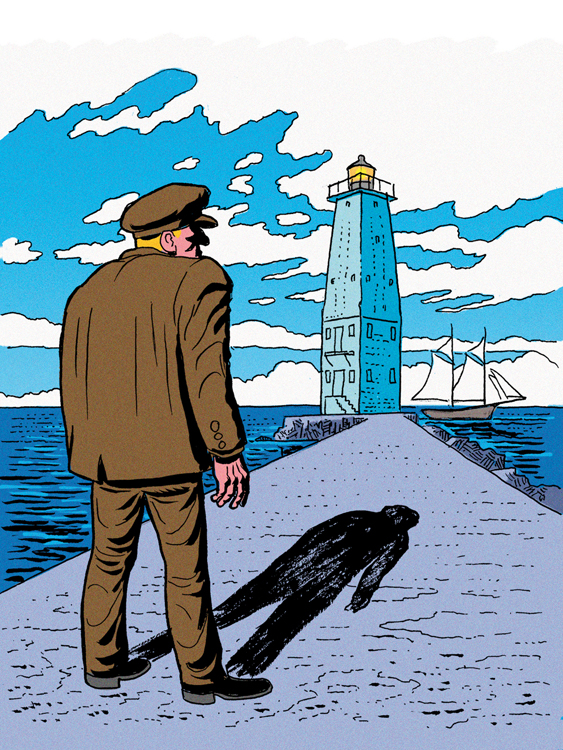
He continued to sail until old age took its toll, sometimes legally, sometimes not (Prohibition was just on the horizon, and what morally questionable lakeman could not think of Canada, just over the horizon?). Ironically, he finished his career as a lawman, but died poor in a nursing home on Valentineтs Day in 1949. Throughout his life he would alternately confirm and deny if he was indeed the famed pirate of the Great Lakes. In 1915 a reporter asked him if he was indeed тDan the Pirate.т
тIтm the man,т Seavey said. тThere is nothing to it. I was an officer of the United States government and was doing my duty when people thought I was a pirate.т
But it didnтt matter. With or without official charges, with or without his approval, he became a pirate. The Chicago Daily Newsт photo of him, probably the most famous in existence, has a handwritten script on the negative: тDan Seavey, Lake Pirate.т When the Inter-Ocean ran its story it came complete with illustrations of buccaneers with earrings and pistols, knives in their teeth.
Piracy is crime, but few know exactly what it is without looking it up. We define it by a lifestyle of those who travel the seas т even freshwater ones т by their own laws, owning a freedom most of us wonтt experience because we lack the guts, guile, or lax morals to pursue. To be a pirate is, in the end, to be a bad person: one who steals from and hurts others. We need the distance т of years or miles or mere fascination т to allow our villains to become our heroes. Because what are pirates, anyway, if not the whimsy and romance of our own imagination, and the stuff of legends?
|
| Ь§ |
|








